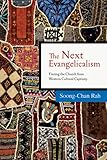Soong-Chan Rah argues powerfully that the evangelical church in America is held captive to Western (he means white) culture. He points to the models of ministry held up as ‘successful’ at conferences and in publishers’ catalogs as evidence that American evangelicalism glorifies the white suburban church as the epitome of what church should look like.
Throughout the first few chapters of the book he deconstructs the way this church works. He points out the secular and sinful foundations of much of what it does in chapters on individualism, consumerism, and racism. He then points to a way forward—something he calls the Next Evangelicalism—found in the immigrant and ethnic minority churches.
As a Korean American immigrant at the age of 6-years old Soong-Chan writes of the immigrant church with a depth of personal experience and insight. He provides a thoughtful assessment of why the Korean American church has grown, and why it intuitively lives out some of the biblical models for the church more effectively than the majority culture churches in America. The resulting question that emerges from his assessment is:
“in the next evangelicalism, is there a possibility of seeing the immigrant church, not as a place of need, but a church community from whom the dominant culture could learn?” (pg. 178)
I think the answer to this question is a resounding “Yes and amen!” Recent statistics alone are enough to warrant further exploration into the immigrant church model—these minority culture churches are growing while the rest of evangelicalism is stagnating. However for me I answer yes to this question more because of anecdotal experience. My father-in-law and my mother-in-law both work as pastors in a Korean American church. I’ve seen the passion with which they serve their community, and I’ve witnessed their community’s subsequent devotion to the church.
I’ve been woken up at 4:30 am when staying at their house because they have to get to church for early morning prayer. I’ve seen their willingness to endure political battles with leaders in the church for the sake of the broader community. I’ve seen my in-laws love for their community spill over into concern for the physical health and well-being of their parishioners. As someone who has grown up in white evangelicalism, I can say without hesitation we all, both pastors and parishioners, have much to learn from my in-laws’ community.
This book attempts to start this process. He calls the white evangelical community to start listening to and learning from the fast growing but often neglected immigrant and multi-ethnic church communities. This has been tremendously encouraging for me. It reminded me of many of the things I learned while working in a predominantly Asian American church in Boston. This book reminded me of the good to be found in that community experience, and it challenged me to think about how these lessons can be shared with my white evangelical community.
My only frustration comes from the fact that he fails to provide any critical assessment of the immigrant church. For all his harsh rhetoric for white evangelicalism, there is not a single qualifier on his praise or any words of caution for how we learn from the immigrant church. For those of us who have seen some of the maladies of the immigrant church (veneration of pastors, fundamentalism, and the frequent schisms and splits), we have questions about how to learn from them. What parts do we appropriate? What parts of its make-up lead to the beautiful community he praises and what parts lead to these less attractive aspects?
I do not think this diminishes the main point of the book, which is the need for white evangelical America to listen to the voice of outsiders, particularly non-white and multi-ethnic church communities. The Next Evangelicalism makes the need for this undeniably clear. This book is fantastic, and I highly recommend it to people of every color and those serving in every role within the church. This is a message that needs to be heard.

Comments
One response to “The Next Evangelicalism: Freeing the Church from Western Cultural Captivity”
Great review. My question though is why didn’t you just keep sleeping when your in-laws woke up at 4:30 AM. 🙂